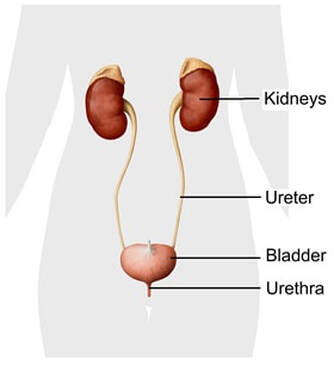 The most common symptom of urinary tract infection is a painful, burning sensation when passing urine. Urinary tract infections are caused by bacteria entering the urethra and multiplying in the bladder. They are usually treated successfully with antibiotics prescribed by a doctor. Urinary tract infections are quite common, especially among women and children. Normal urine is sterile and contains no germs such as bacteria, viruses, or fungi. Urinary tract infections (UTIs) occur when bacteria enter the urinary tract via the urethra. UTIs are most commonly caused by bacteria that normally live in the bowel. The urinary tract consists of the kidneys, bladder, ureters, and urethra. The urethra is the opening to the urinary tract where urine comes out. UTI can be classified by the area of the urinary tract that it affects:
Risk factors Females are particularly at risk of getting a UTI because bacteria can more easily move into their urinary tracts due to the urethra and anus being close together. Other factors that can increase the risk of UTIs include:
The most common symptom of a UTI is a painful, burning sensation when passing urine. Other symptoms include:
If your child is toilet trained and suddenly starts to wet their pants again, or doesn't want to pass urine because of pain, it could be a sign of a UTI. You should see your family GP if your baby or child has any of the signs and symptoms indicating they might have a UTI. Because UTIs can make babies and young children seriously ill, a doctor or after-hours medical centre should be seen as soon as possible if they have one or more of the following symptoms:
UTIs are usually treated successfully with antibiotics. The course of antibiotics is taken orally, usually from three to ten days depending on circumstances. Symptoms are usually relieved within 24 to 48 hours of the first dose of antibiotics being given, but it is important to finish the full course of antibiotics as prescribed to ensure that the infection does not come back, and to prevent the infection from becoming resistant to the antibiotic (i.e. the antibiotic will not work as well if the infection returns). With more complicated and recurrent infections there may be an underlying cause such as urinary (vesicoureteral) reflux in children. If an underlying cause is suspected it needs to be identified and appropriately treated where possible. Diagnostic tests that may be used include ultrasound or computerised tomography (CT) scans and specialised x-rays of the urinary tract. If there is a history of recurrent UTIs due to a known underlying cause, a cystoscopy may be performed to see inside the urethra and bladder, and low-dose antibiotics may be given daily for a period of weeks or months to prevent UTIs developing. If kidney infection develops, hospitalisation may be required so that antibiotics can be administered through a drip. The following general steps can help prevent a UTI developing:
CLICK HERE TO SHOP FOR PRODUCTS. INSTORE ,WE OFFER A UTI CONSULT WITH A PHARMACIST. We are able to sell an antibiotic called trimethoprim for the treatment of UTIs. This is available without a prescription to women aged 16–65 years, who are not pregnant and do not have any other complicating factors. It takes about 10 to 15 minutes to do the consult.
1 Comment
Alex
28/4/2024 03:35:16 pm
I recommend!
Reply
Leave a Reply. |
News from us to youEverything you wanted to know about pharmacy and medications but you never asked. Archives
June 2024
Categories
All
|
The fine print |
We are your locally owned pharmacy, proudly supporting the Tauranga community since 1993. |
© John's Photo Pharmacy 2021 | Site powered by Whitfield Consulting

 RSS Feed
RSS Feed


